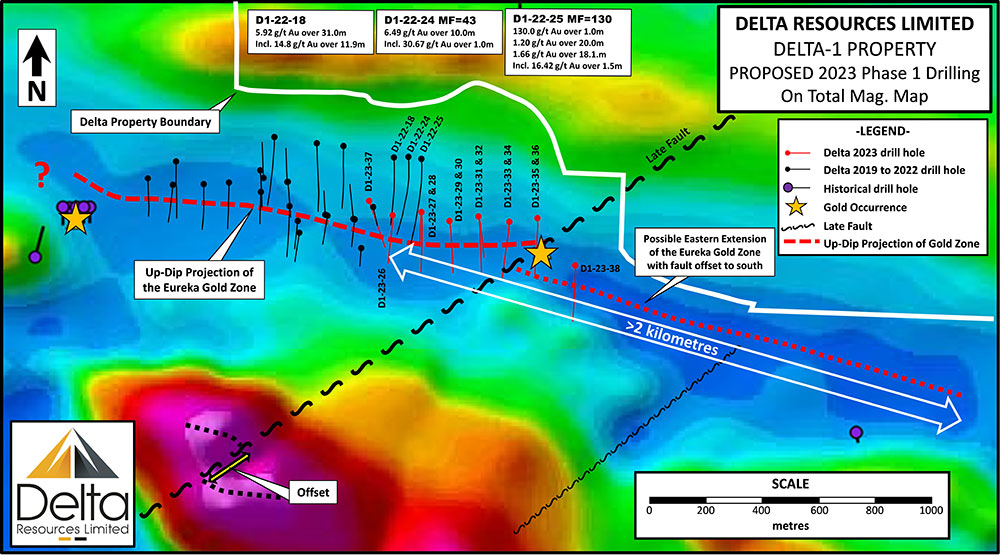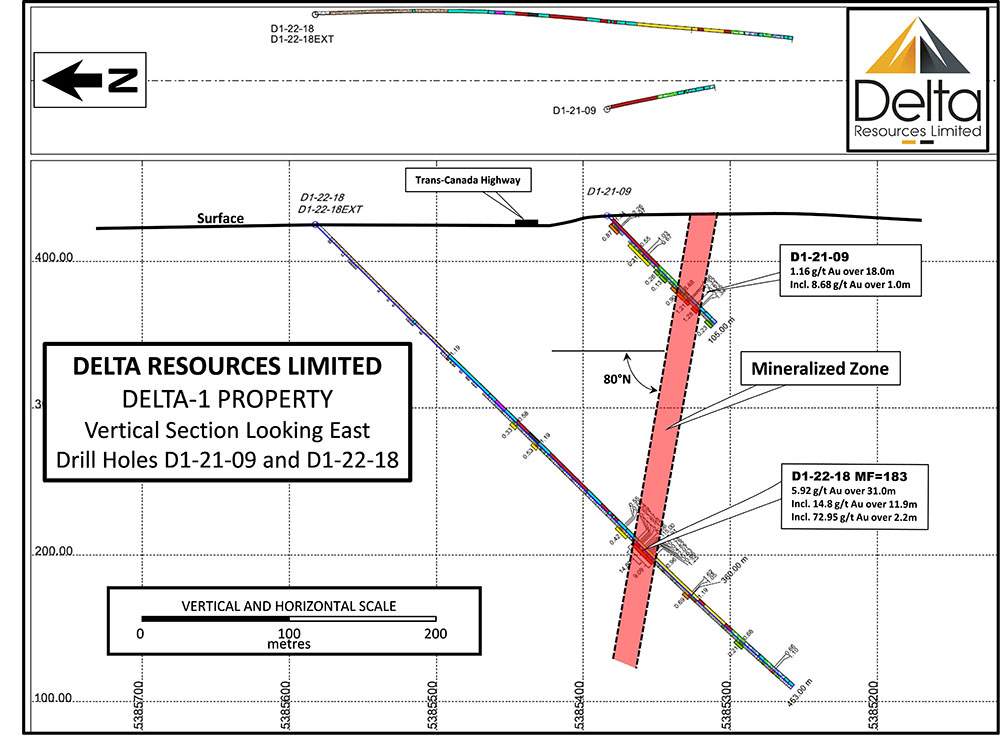Kingston, Ontario–(Newsfile Corp. – March 21, 2023) – Delta Resources Limited (TSXV: DLTA) (OTC Pink: DTARF) (FSE: 6GO1) (“Delta” or “the Company”) is pleased to provide an updated gold intercept in drill hole D1-22-24 and a newly revised interpretation of the Delta-1 Gold project located 50 km west of Thunder-Bay, Ontario.
Improved Gold Intercept of drill hole D1-22-24:
On February 9, 2023, Delta had announced a gold intercept of 5.32 g/t over 8.0 metres on drill hole D1-22-24. Additional metallic sieve analyses of the mineralized zone have now increased the gold intercept to 6.49 g/t gold over 10.0 metres with an additional one metre sample returning 22.22 g/t gold (see Table 1).
New Geophysical and Geological Interpretation:
As Delta continues its current drill campaign at Delta-1, new structural and geophysical insights on the Eureka mineralized zone have emerged that significantly enlarge the potential area for gold on the property.
As previously reported in a press release dated February 9, 2023, high-grade drill intercepts from drill holes D1-22-18, D1-22-24 and D1-22-25 (see Table 1 for previously released significant results) suggest that higher-grade gold occurs towards the east and at depth. From these most recent drill holes, the following conclusions can be drawn:
- The Eureka Gold Zone appears to be associated with the core of a magnetic-low anomaly (see Figure 1). The newly identified geophysical signature extends over a minimum of two kilometres east of drill holes D1-22-18, D1-22-24 and D1-22-25, where high-grade gold was intersected. The projection of the mineralized zone has never been drill-tested in the area and occurs entirely on Delta’s properties.
- In the western portion of the Eureka Gold Zone, the mineralization trends generally 090 to 100 degrees azimuth and dips approximately 50 degrees towards the North. In the eastern portion of the Eureka Gold Zone, the trend of the mineralization turns to 115 degrees azimuth (see Figure 1) and dips 80 degrees towards the north (see Figure 2). This flexure in the structural zone may be responsible for the higher grades of gold encountered in the recent drill holes.
- In the western portion of the Eureka Gold Zone, mineralization is hosted in intensely altered sandstones near their contact with ultramafic flows to the south. Meanwhile, in the eastern portion of the Eureka Gold Zone, gold mineralization is hosted within intensely altered and brecciated mafic to intermediate volcanic rock near their contact with altered sandstones to the north. The change of host rock may also contribute to the higher-grade gold encountered in the eastern portion of the mineralized zone. Furthermore, the sandstone-volcanic contact has never been tested in the western portion of the gold zone.

Table 1: Table of results from Drill holes D1-22-18, D1-22-24 and D1-22-25, the easternmost drill holes of the Eureka Gold Zone at the Delta-1 Property, 50 kilometres west of Thunder Bay, Ontario. Results show the new gold intercept of drill hole D1-22-24.
The interpretations and possible implications of these new observations are as follows:
- The high-grade mineralized zone can be projected to the east from its geophysical signature for over two kilometres onto Delta-controlled properties. This area is now considered a top priority as it has never been drill-tested.
- As the dip of the zone becomes steeper, the mineralized zone is expected to project down-dip onto Delta-controlled ground to great depth.
- The sandstone-mafic volcanic contact, where high-grade gold mineralization is encountered in the eastern portion of the mineralized zone, has never been thoroughly tested in the western portion of the gold zone since gold intercepts occurred in sandstone and holes were stopped prior to the mafic volcanic contact. Furthermore, the contact was never tested at depths below 200 metres vertical, where high-grade gold was intercepted in the east. This has also now become a top-priority target opening a potential 1.2 kilometres of strike length south of Delta’s 2019 to 2022 drill holes.
André Tessier, President and CEO, commented: “With each drilling program at Delta-1, we are gaining a better knowledge of the mineralized zone with gold-grade intercepts also improving. This is truly a very exciting project for Delta and the new interpretations provided in this release are just getting the team even more excited. Delta is now drilling to test the eastern extension of the zone and we are waiting for the results of our first holes with great anticipation.”
Figure 1: Magnetic map of the Eureka Gold Zone and its projected extensions. The projected zone is characterized by a magnetic low (in blue). The geophysical signature of the zone suggests that it turns at 115 degrees azimuth and extends towards the east for a minimum strike length of two kilometres. The inflection in the structure may be responsible for the higher-grade gold mineralization in the area.
Figure 2: Vertical cross-section of drill holes D1-21-19 and D1-22-18 looking east. The section shows the mineralized zone to be dipping steeply at 80 degrees towards the north, in the eastern portion of the Eureka Gold Zone.
DELTA-1 DRILLING UPDATE
Delta has now completed 13 drill holes (D1-23-26 to D1-23-38) for a total of 3,505 metres from its previously announced on January 2023 drill program, testing the 3D modelled eastern extension of the Eureka Gold Zone. Unfortunately, continued cold weather in the area has forced the drilling program to be temporarily suspended due to a lack of water availability, which is required to operate the drill. This issue is expected to be resolved shortly and Delta will update its shareholders when drilling resumes at Delta-1 with an expanded drill program. Preliminary observations on the initial 2023 drill holes were released on March 1, 2023, but all assay results are still pending. Initial assay results are expected within a few weeks.
Analytical Protocol and QA/QC
Chemical analyses reported in this press release were performed at SGS Canada Minerals Laboratories. Sample preparation was performed in Sudbury, Ontario. Sampling and analytical procedures are subject to a comprehensive Quality Assurance and Quality Control program that includes duplicate samples, blanks and analytical standards.
The following assaying protocol was adopted at Delta-1 in an attempt to reduce the assay variability due to nugget effect caused by visible gold:
- If no visible gold is observed in the sample, an initial assay is performed by 50 g Fire Assay with ICP-OES finish at the SGS Laboratory in Burnaby, British Columbia. If the assay result exceeds 2.0 g/t gold, remaining rejects are pulverized, a 1 kg portion is screened to 106µm and analyzed by 50 g fire assay with gravimetric finish at the SGS Laboratory in Lakefield, Ontario.
- If visible gold is observed in the sample, the assay is performed by Metallic Screening, whereby a 1 kg sample is pulverized, screened to 106µm and analyzed by 50 g fire assay with gravimetric finish at the SGS Laboratory in Lakefield, Ontario.
NQ-size drill core was sawed in half lengthwise and half of the core was sampled and sealed in clean plastic bags before being shipped for assay. The remaining half of the core was replaced in core boxes and is stored at Delta’s core storage facilities. Standards and blanks are inserted in the sequence of samples on site as quality assurance and quality control in addition to the regular insertion of blank, duplicate, and standard samples accredited by SGS Canada Minerals Laboratories during the analytical process.
Qualified Persons
Andre Tessier, P.Eng and P.Geo, President and CEO of Delta, and Daniel Boudreau, P.Geo. Manager of Exploration of Delta Resources Limited are the Qualified Persons as defined by NI-43-101. Both have reviewed the technical information presented in this press release.
Acknowledgement
Delta Resources would like to acknowledge the financial support provided by the Ontario Government via the Ontario Junior Exploration Program (“OJEP”) in 2022-23. Delta will be receiving up to $200,000 upon completion of its exploration program at Delta-1.
About Delta Resources Limited
Delta Resources Limited is a Canadian mineral exploration company focused on growing shareholder value through the exploration of two very high-potential gold and base-metal projects in Canada.
- DELTA-1 covers 58.3 square kilometres located 50 kilometres west of Thunder Bay, Ontario where a gold mineralized zone 950 metres long was outlined through drilling in a multi-kilometre-scale intense alteration halo. Best grades to date include a drill intercept of 14.8 g/t Au over 11.9 metres, within a broader interval of 5.92 g/t Au over 31 m. The zone is open in all directions.
- DELTA-2 VMS and DELTA-2 GOLD covers 194 square kilometres in the prolific Chibougamau District of Quebec. The property holds excellent potential for gold-rich polymetallic VMS deposits as well as hydrothermal-gold deposits. Delta targets VMS deposits such as the LeMoine past producer where 0.76 Mt were mined between 1975 and 1983, grading 9.6% Zn, 4.2% Cu, 4.5 g/t Au and 84 g/t Ag.
ON BEHALF OF THE BOARD OF DELTA RESOURCES LIMITED.
Andre C. Tessier
President, CEO and Director
www.deltaresources.ca
We seek safe harbor. Neither TSX Venture Exchange nor its Regulation Services Provider (as that term is defined in the policies of the TSX Venture Exchange) accepts responsibility for the adequacy or accuracy of this release. The TSX Venture Exchange has not approved nor disapproved of the information contained herein.
For Further Information:
Delta Resources Limited
Frank Candido, Chairman, VP Corporate Communications
Tel : 514-969-5530
fcandido@deltaresources.ca
or
Andre Tessier, CEO and President
Tel: 613-328-1581
atessier@deltaresources.ca
Cautionary Note Regarding Forward-Looking Information
Some statements contained in this news release are “forward-looking information” within the meaning of Canadian securities laws. Generally, forward-looking information can be identified by the use of forward-looking terminology such as “plans”, “expects”, “is expected”, “budget”, “scheduled”, “estimates”, “forecasts”, “intends”, “anticipates”, “believes” or variations of such words and phrases (including negative or grammatical variations) or statements that certain actions, events or results “may”, “could”, “would”, “might” or “will be taken”, “occur” or “be achieved” or the negative connotation thereof. Investors are cautioned that forward-looking information is inherently uncertain and involves risks, assumptions and uncertainties that could cause actual facts to differ materially. There can be no assurance that future developments affecting the Company will be those anticipated by management. The forward-looking information contained in this press release constitutes management’s current estimates, as of the date of this press release, with respect to the matters covered thereby. We expect that these estimates will change as new information is received. While we may elect to update these estimates at any time, we do not undertake to update any estimate at any particular time or in response to any particular event.


